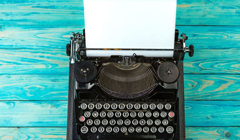- Brooke Warner
- Confessions of a Book Editor

 When I got into book publishing I was an inexperienced 23-year-old whose previous work experience was waitressing and a couple of cherry college internships that had nothing to do with publishing. I worked my way up the ranks, learning publishing and how to edit books. I’ve made plenty of mistakes along the way—the kind that sting but make you better at what you do. Coming up in traditional publishing taught me that Chicago Manual of Style is our Bible, that good copyeditors are worth their weight in gold, and that every book, even the best edited books, get published with some typos.
When I got into book publishing I was an inexperienced 23-year-old whose previous work experience was waitressing and a couple of cherry college internships that had nothing to do with publishing. I worked my way up the ranks, learning publishing and how to edit books. I’ve made plenty of mistakes along the way—the kind that sting but make you better at what you do. Coming up in traditional publishing taught me that Chicago Manual of Style is our Bible, that good copyeditors are worth their weight in gold, and that every book, even the best edited books, get published with some typos.
I’ve spent the last 17 years in one of the most subjective industries around. Sometimes I love this subjectivity. I love that book publishing is creative, and that one person’s cup of tea can vary quite a bit from another’s. But I’ve also been part of a sea change in the industry in these past nearly two decades in which we’ve seen book publishing go from an endeavor reserved for the elite few to something anyone can do. The rise of self-publishing has made editors all the more indispensable, frankly, but it’s also created a world in which anyone can publish unedited work, and in which anyone can—and does—call themselves an editor.
A old client of mine recently reached out to inform me that she’d shared her manuscript with an editor who told her it needed another edit. Conveniently, this editor was available for the job. This scenario plays out from time to time, and depending on the author and the editor in question, I’ve sometimes felt guilty or wrong in such moments, and other times angry and defensive. Today I’m seasoned enough that I feel more confident than I used to about how publish-ready a project I’ve worked on might be. In this case I knew the book was solid, so instead of getting upset, I got contemplative. Turning inward, musing on these many years of editing, confessions started to bubble to the surface:
Confession: I practically rewrote a book it was so badly executed in its early drafts. It was a popular subject, covering taboo ground and very explicit in some chapters. I tried to salvage it as best I could, but in the end allowed it to be published, knowing it wasn’t an A+ effort. This book ended up being the most award-winning book I ever worked on.
Takeaway: A book’s success is sometimes driven by the subject matter and not how excellent or A+ the writing is.
Confession: I distrusted my own judgment about a manuscript I truly loved. I allowed another less experienced editor to do an assessment of it because the author wanted a second opinion. To this day I believe the assessment was off, and too critical. I shared it with the author anyway, believing I’d gotten too close to her. She was devastated and put the book aside indefinitely.
Takeaway: Editors are human. We can get too close to our authors, and readers vary in what they like. A critical assessment may have to do with your execution, or it may stem from an editor not jiving with your subject, your voice, or your style.
Confession: I had a client who was so concerned about money that I felt the strain of this every time we met. In trying to save her money, I inadvertently created more work for her, and ultimately counteracted whatever savings I thought I was securing when she ended up having to get a second edit because the first one I lined up for her was actually a proofread, and too light, and she got critical feedback from her beta readers about the status of the manuscript after that first editorial pass.
Takeaway: Editors sometimes get emotionally entwined, and can take on the burden of their client-authors. If you sense a strategy that seems like it’s cutting corners, ask about the potential fallout.
Confession: I’ve worked with authors to midwife their books, putting them through a rigorous developmental process, only to come out the other side knowing that the manuscript we’ve just birthed is less than it could be. On occasion I’ve tried to push an author past the limits of what they can do, but this is an exercise in futility. Sometimes a book needs to come into the world in all its imperfection, and both the author and the editor need to let it be good enough. I’ve edited “good enough” books, and I’ve learned from experience that these books find their way, and their audiences.
Takeaway: There’s room in publishing for masters and apprentices, as long as both subject themselves to good editing. You cannot write your magnum opus as your first effort. It’s something all authors build toward. Publish along the way.
Confession: As much as I’m a populist and a champion of indie authors, I’m not a champion of editors who come to their profession because they like to read, or just because they wrote a book. Good editors are hard to find, and honestly good copyeditors and proofreaders even more so. I’m always shocked to see a book I’ve developmentally edited come back from the copyeditor marked up for grammar. At any stage, the likelihood of editors missing something or a few things is basically 100%. Put your faith in us, but don’t treat us like gods.
Takeaway: Never let your book go to the printer without reading it one more time all the way through, no matter how painful this might be. And enroll friends or beta readers at the very last stage, asking people to read through to catch typos only. And when they do, remember the part about editors not being gods. Publishing well is a collaborative effort, and anyone who tells you otherwise is not being collaborative.
Save
Writing Status Badges












Writing Status Badges












Featured Members (7)
Writing Status Badges
















































Thanks for your responses, Katrina and Mary, and to Frances, too. Insightful comments and helpful for me as well.
I enjoyed this post. I am near the end of a year-long developmental edit (the pace is slower because I still work full time.) I can't imagine editing my own book. I wouldn't have the manuscript I have without a professional editor's eyes. I'm confident I will submit only my best work. Kudos as well to Frances Brown's comment on this post.
Your honesty, wisdom and insight into the current mud-and-gravy state of editing and publishing is something I'm grateful for today--a few days before Thanksgiving (my favorite holiday of all). Thank you, Ms. Warner. As a freelance editor (not soliciting new work), I agree that editors (and "editors" who really might be beta readers) are necessary and but there are some evils involved in the process. Here's a confession from my personal experience: It's sometimes a struggle to communicate with a writer, but the burden is always on the editor to navigate those troubled waters. Always. There have been times when I've realized after the fact that I was less-than-clear about my expectations for improvement of a manuscript and then I've worked hard and at my own expense to get to a resolution. Although I would like to say that those few times when this happened did not create a bias and a change in attitude toward the author and the manuscript, they did indeed have an impact on our relationship. So it is true: Editors should be seen as one of the book's housekeeping staff, or as a word/symbol janitors!
great post Brooke! The first confession made me smile and gave me some more hope on this rainy morning. Thanks for sharing it. I love your honesty and the way you give us a glimpse into your multi-faceted world. It makes me feel that we are all in this together, and that with Shewrites I am in good hands.
Catherine, yes, you can contact us at she writes. We offer editorial services: brooke [at] shewritespress [dot] com.
I found this posting very enlightening and hopeful for my own writing. I have been exposing my hybrid writings to a critique group for technical advice and general feedback. I find that as I continue to write there is a balance of taking such advise while still remaining true to what fueled the writing in the first place. I may never publish this work, or any other for that matter, as its the process of writing that intrigues and inspires me. But your words on editing remind me of those important steps. And as a graphic designer for 20 years I too have advised my clients to always have many others proof their copy and even when done there is the possibility of error - we are all human.
Thank you for your thoughtful comment, Frances! I appreciate this.
Ironically, I'm looking for an editor. Reasonably priced, trustworthy and full of guts and glory (guts because of the subject matter; glory for some actual, reliable credentials).
Any recommendations out there?
I am so profoundly grateful for having found SWP at this point in my writing life. Thank you for all you have learned and allowing us to be the beneficiaries of your lessons.
Great post. Thank you
Thank you for these enlightening insights, Brooke. As an author who has dealt with a a number of traditional small publishers, then gone on to self-publish, I can tell you the majority of your takeaways are absolute truth.
The shame, I think, is on those who either a. think they are good enough to edit their own work, or b. trust their editors completely, taking their suggestions and corrections as gospel, or (the worst one), c. have never published a book and don't have any sort of degree in English who call themselves editors, and charge for their services.
I have had experiences with b and c. I have fallen prey to the editor who argued that my characters were American, not British, and therefore should NOT prefer tea to coffee. I have paid a well-advertised editor a considerable amount of money, only to get back the manuscript with so many glitches, I almost asked for my money back. Perhaps I should have.
The last takeaway I agree with the most: Never let your book go to the printer without reading it one more time all the way through... This is absolutely, positively PARAMOUNT to ensuring that, although there may not truly a perfectly edited book, the author needs to strive for that goal at all costs. After all, it's our name on the thing.
I will also add that I've caught more glitches in my own awkward phrasing, grammar faux pas, repetitions, etc by LISTENING to a recorded version of the book than by reading it. It's funny what the ear can catch that the eye skips over.
Thanks so much for your thoughtful post!